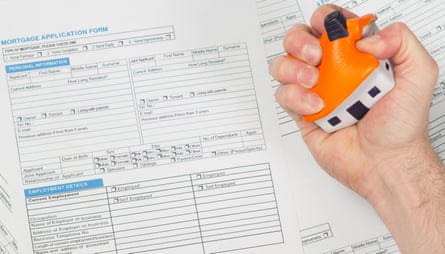Rates on new mortgages continued to climb this week as the fallout from the mini-budget continued to reverberate through the housing market. The higher rates on offer are bad news for first-time buyers and those looking to remortgage, who face much bigger monthly payments. So how bad are things, and what can you do?
So what has been happening this week?
Most of the mortgage lenders that effectively pulled down the shutters in the wake of the financial turbulence sparked by the 23 September mini-budget have now re-entered the market. For example, NatWest relaunched deals on Monday, Barclays on Tuesday and Halifax on Wednesday.
But while there had been hopes in some quarters that the government’s 45p tax U-turn on Monday, and the slightly calmer market conditions that have followed, might translate into slightly cheaper new fixed-rate mortgage deals, this has yet to happen. In fact, this week new mortgage products continued to become even more expensive. The average new two-year fixed rate – which was 4.74% on the day of the mini-budget – was at 5.75% on Monday and by Friday had climbed to 6.16%, according to the data firm Moneyfacts. It was a similar story with five-year fixes, with the average rate on Friday standing at 6.07%.
But you can get better rates than those averages. At the time of writing, the Halifax was offering new two-year fixes for those remortgaging from 5.06%, with rates on five-year fixes starting from 4.46% – so quite a bit lower. However, deals are coming and going at remarkable speed at the moment.
Rising average mortgage rates may partly reflect the fact that the government U-turn only happened on Monday, so – taking an optimistic view – lenders will need a little time to properly respond. They are under pressure to reduce their new product rates after the chancellor, Kwasi Kwarteng, met banks on Thursday, and if the financial markets continue to stabilise, that will obviously help.
 View image in fullscreenThe government’s 45p tax U-turn and the slightly calmer market conditions have yet to translate into slightly cheaper new fixed-rate mortgage deals.
View image in fullscreenThe government’s 45p tax U-turn and the slightly calmer market conditions have yet to translate into slightly cheaper new fixed-rate mortgage deals.
Photograph: Matthew Kay/Alamy
Some brokers have predicted lenders will start trimming their rates over the next week or fortnight, assuming the markets remain relatively stable.
How monthly costs are soaring
Let’s take the example of someone who, in October 2020, took out a two-year fixed rate deal priced at 1.59% (a pretty good rate then). It’s a £200,000 25-year repayment mortgage. They have been repaying £808 a month. Let’s say they now remortgage on to a two-year fix from Halifax at 5.06% (we’ll now assume £190,000 and 23 years left but everyone’s situation will be different). Their new payment would be £1,166 – an extra £358 a month. They would actually be better off, financially speaking, taking Halifax’s new five-year fix, which is a fair bit cheaper at 4.46%, as then the new payment would be £1,102.
What is the best advice?
For those who will need to remortgage at some point, clearly a lot depends on when your current deal ends. It is estimated that about 300,000 borrowers come off a fixed-rate deal every three months.
However, many of those worried about the current situation have deals that maybe do not expire for another year or more.
The mortgage broker Private Finance says it is encouraging those on a fixed rate with a term of 18 months or less “to get in touch and consider their remortgage options now”. Talking your options through with a broker is definitely a good idea at the moment.
The obvious problem is that we do not know whether mortgages are going to become more expensive or cheaper over the coming months.
 View image in fullscreenMost of the mortgage lenders that withdrew products in the wake of the market turbulence sparked by the mini-budget have re-entered the market. Photograph: Adam Vaughan/EPA
View image in fullscreenMost of the mortgage lenders that withdrew products in the wake of the market turbulence sparked by the mini-budget have re-entered the market. Photograph: Adam Vaughan/EPA
Some people will be wondering about bailing out of their current deal early and grabbing another one now, before prices go up even more. However, most fixed-rate products have early repayment charges (ERCs) during the initial fixed period, which will sometimes be thousands of pounds. Plus, of course, you are leaving a low rate early and moving to something more expensive.
The good news is that a lot of lenders’ mortgage offers are valid for up to six months.
So one option is that homeowners whose existing deals still have a way to go but who are concerned could hedge their bets by reserving a deal now and waiting to see how things pan out. If home loan rates have gone down, you are not committed to the mortgage offer. If rates have soared even higher, you can at that point do the maths to see how much money you would have to pay to quit your current deal early versus what you might theoretically save by signing up for the offer deal rather than paying a higher rate. But that is not a straightforward business.
David Hollingworth at the broker L&C Mortgages says that rather than stumping up cash to pay an ERC, you might be better off using that money to try to reduce your current mortgage debt.
He adds that if you are sitting on a low rate and have the funds, you could start putting a bit of money aside in a savings account now, ready for when your monthly bill does go up – savings rates are a lot better than they were – or, alternatively, you could overpay your mortgage, though there will be limits on how much you can pay off.
Clearly, borrowers also have the option of going on to something like a tracker deal, but with predictions of multiple base rate rises to come, any initial advantage could quickly evaporate.
For first-time buyer borrowers, it is clearly a very challenging time. A lot depends on whether, and by how much, house prices fall. There were warnings this week from some brokers that low-deposit 95% mortgages could be the next casualty of the financial uncertainty because of the risk of buyers ending up in negative equity. Some fear the number of deals could be slashed; others that they could disappear completely for a while, as happened during the first few months of the coronavirus pandemic in 2020.
Are lenders withdrawing offers?
Chris Sykes at Private Finance says: “There’s no need to panic about the current situation with regard to cases which have had an offer accepted, as long as the mortgage application is in place. There has been a lot in the press about lenders pulling offers; however, this is not the case for normal residential transactions, which will be the vast majority.
“There have been very few examples of lenders pulling rates for clients post-application. The only examples of this are in unregulated commercial and BTL [buy-to-let] lending situations.”
What else can I do?
 View image in fullscreenAre you a first-time buyer? Photograph: Adam Vaughan/EPA
View image in fullscreenAre you a first-time buyer? Photograph: Adam Vaughan/EPA
In these challenging conditions, with everyone a bit jumpy, one of the key things for mortgage applicants – particularly first-time buyers – is to make sure your credit record and finances are in as good a state as possible.
Ideally, get a copy of your credit file from one or all of the credit reference agencies (the three main ones are Equifax, Experian and TransUnion) before you apply, go through it carefully and, if possible, take any action needed. Pay down outstanding debts and look at what you can cut from your spending.
“Borrowers need to be careful in tough times, as something as small as getting a CCJ [county court judgment] by refusing to pay a £60 parking fine, or missing payments on utility bills after moving out of a property, can affect the lenders at a borrower’s disposal, and affect their interest rates if these were recent and they have little other credit presence,” Sykes says.



Leave a Reply
You must be logged in to post a comment.